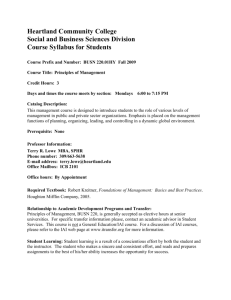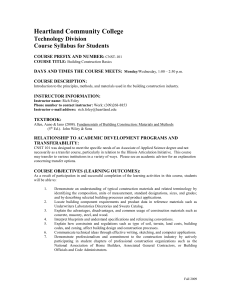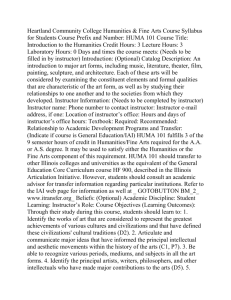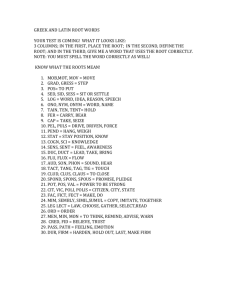POS 101 01 LEWIS FA 12 - Heartland Community College
advertisement
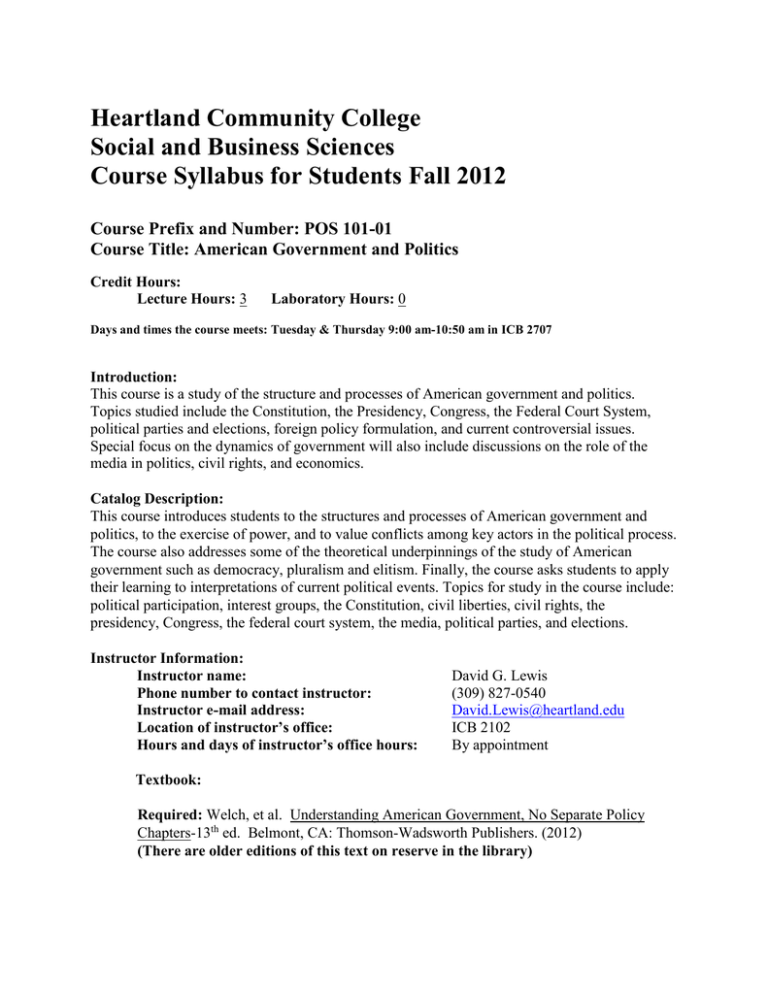
Heartland Community College Social and Business Sciences Course Syllabus for Students Fall 2012 Course Prefix and Number: POS 101-01 Course Title: American Government and Politics Credit Hours: Lecture Hours: 3 Laboratory Hours: 0 Days and times the course meets: Tuesday & Thursday 9:00 am-10:50 am in ICB 2707 Introduction: This course is a study of the structure and processes of American government and politics. Topics studied include the Constitution, the Presidency, Congress, the Federal Court System, political parties and elections, foreign policy formulation, and current controversial issues. Special focus on the dynamics of government will also include discussions on the role of the media in politics, civil rights, and economics. Catalog Description: This course introduces students to the structures and processes of American government and politics, to the exercise of power, and to value conflicts among key actors in the political process. The course also addresses some of the theoretical underpinnings of the study of American government such as democracy, pluralism and elitism. Finally, the course asks students to apply their learning to interpretations of current political events. Topics for study in the course include: political participation, interest groups, the Constitution, civil liberties, civil rights, the presidency, Congress, the federal court system, the media, political parties, and elections. Instructor Information: Instructor name: Phone number to contact instructor: Instructor e-mail address: Location of instructor’s office: Hours and days of instructor’s office hours: David G. Lewis (309) 827-0540 David.Lewis@heartland.edu ICB 2102 By appointment Textbook: Required: Welch, et al. Understanding American Government, No Separate Policy Chapters-13th ed. Belmont, CA: Thomson-Wadsworth Publishers. (2012) (There are older editions of this text on reserve in the library) Relationship to Academic Development Programs and Transfer: POS 101 fulfills 3 of the 9 semester hours of credit in Social and Behavioral Sciences required for the A.A. or A.S. degree. This course should transfer as part of the General Education Core Curriculum described in the Illinois Articulation Initiative to other Illinois colleges and universities participating in the IAI. However, students should consult an academic advisor for transfer information regarding particular institutions. Refer to the IAI web page at www.itransfer.org for more information. Course Policies: The course policies for this class are very detailed in order to: a) avoid any confusion b) be fair to all of the students enrolled in this course. With clearly defined rules and expectations every student knows what is expected of them, and every student is treated equitably. Please take judicial notice that no students are exempt from the policies outlined in this syllabus for any reason, this way no one is either privileged or disadvantaged. Course Objectives (Learning Outcomes): Course Outcomes 1. Understand, identify, explain, and apply several key theories common to American government, power, and citizenship such as democracy, elitism, and pluralism 2. Ask, research, and answer an important question regarding the American political system by using an approach, such as the scientific method, appropriate to the social sciences 3. Communicate effectively about the American political system either orally or in writing or both 4. Explain, contextualize, and evaluate the US constitution and the systems of separation of powers, checks and balances and federalism 5. Identify and explain the value conflicts that characterize common political ideologies in the US and identify and articulate their personal political ideology 6. Explain, contextualize, and evaluate the Bill of Rights, civil liberties, and civil rights 7. Identify several of the functions of political parties, interest groups, and elections in the U.S. 8. Evaluate the role of the mass media in the US political system. 9. Identity several of the functions of the legislative, executive, and judicial branches in the US government 10. Apply a variety of class concepts to an explanation of current political events and explore those current events *POS Program Outcome POS 1: Ask and answer political questions by conducting, using, and interpreting Political Science research techniques such as the scientific method. POS 2: Understand, identify, and explain a variety of theories and concepts common to the study of Political Science and apply these theories and concepts to the world around them. POS 3: Use a variety of theories and concepts common to the study of Political science to comprehend, analyze, and evaluate the political events around them. POS 4: Communicate both orally and in writing in ways appropriate tot eh field of Political Science. POS 5: Acquire the tools necessary to enhance active and ethical engagement and participation in the political process at the local, state and national, and/or international levels. POS 6: Reflect upon one’s personal goals, ideology, responsibility, and place in any given political system. POS 7: Be able to negotiate value conflicts among a variety of stakeholders in any given political situation. HCC’s General Education Outcomes are Written and Oral Communication, Problem Solving, Critical Thinking, and Diversity. Course/Lab Outline: Topic Outline for the Course: The following topics are to be covered during the instructional process: 1. Politics and Science 2. Political Ideology and Public Opinion 3. Democracy, Elitism, and Pluralism 4. The Constitution 5. The Bill of Rights, Civil Liberties, and Civil Rights 6. Federalism 7. Mass Media, Elections, Political Parties, and Interest Groups 8. Congress 9. Presidency and Bureaucracy 10. Federal Court System Method of Evaluation (Tests/Exams, Grading System): 2 Exams (Midterm & Final) 3 quizzes 1 research paper of 4 – 6 pages 1 presentation of your research paper (4-6 minutes) Grading System: 2 exams 3 quizzes 1 paper or report 1 presentation =200 points =150 points =100 points =50 points Total Points =500 450-500 400-449 350-399 300-349 300 or less =A =B =C =D =F Participation (or Attendance): You are expected to attend each and every class meeting. You are expected to come to class prepared. You are expected to contribute to class discussion regularly whether you receive a grade for participation or not. There will be no points given for merely attending class however attendance will be taken daily and should your grade be borderline, attendance will be taken into consideration (10 pts will be given for 95% attendance, 30 out of 32 classes). Incompletes Under extra-ordinary circumstances an incomplete may be given at the instructor’s discretion, if the student has completed more than 50% of the graded assignments and if the instructor believes that the student is likely to finish the course. No one has an automatic right to receive an incomplete. Make-up of tests and assignments: It is my belief that situations do occur from time to time that are beyond our control. Understanding this I will set a clear policy for make-ups. In this class I will grant one make-up under special circumstances (unless on University business, i.e. athletics or student government). Be forewarned that all make-ups will be an alternate version of the original assignment. I urge you not to place yourself in the position of asking for extensions or make-ups if at all possible. Academic Integrity and Plagiarism (Optional) Academic Integrity Academic integrity is a fundamental principle of collegial life at Heartland Community College and is essential to the credibility of the College’s educational programs. Moreover, because grading may be competitive, students who misrepresent their academic work violate the right of their fellow students. The College, therefore, views any act of academic dishonest as a serious offense requiring disciplinary measures, including course failure, suspension, and even expulsion from the College. In addition, an act of academic dishonesty may have unforeseen effects far beyond any officially imposed penalties. Violations of academic integrity include, but are not limited to cheating, aiding or suborning cheating or other acts of academic dishonesty, plagiarism, misrepresentation of data, falsification of academic records or documents and unauthorized access to computerized academic or administrative records or systems. Definitions of these violations may be found in the college catalog. Plagiarism Plagiarism is the presenting of others’ ideas as if they were your own. When you write a paper, create a project, do a presentation or create anything original, it is assumed that all the work, except for that which is attributed to another author or creator, is your own. Plagiarism is considered a serious academic offense and may take the following forms: 1 Copying word-for-word from another source and not giving that source credit. 2 Paraphrasing the work of another and not giving that source credit. 3 Adopting a particularly apt phrase as your own 4 Using an image or a copy of an image without crediting its source 5 Paraphrasing someone else’s line of thinking in the development of a topic as if it were your own. 6 Receiving excessive help from a friend or elsewhere, or using another project as if it were your own. Note that word-for-word copying is not the only form of plagiarism. The penalties for plagiarism may be severe, ranging from failure -on the particular piece of work, failure in the course or expulsion from school in extreme cases. [Adapted from the Modem Language Association’s MLA Handbook for Writers of Research Papers. New York: MLA, 1995: 26] HCC Portal Just a reminder that to access BlackBoard, IRIS, and your Heartland Student Email, you will need to log into myheartland, at https://my.heartland.edu. Academic Support Center Services: Library The Library, located in the Student Commons Buildings at the Raab Road campus, provides Heartland students with a full range of resources including books, online journal databases, videos, newspapers, periodicals, reserves, and interlibrary loan. Librarians are available to assist in locating information. For more information, please call the Library (309) 268-8200 or (309) 268-8292 Tutoring Services Heartland Community College offers tutoring in various forms at no cost to Heartland students at the Tutoring and Testing Center in Normal and at the Pontiac and Lincoln Centers. Tutors are available at convenient times throughout the week. Study groups are also available by request. For more information about services available at each location, please call the Tutoring and Testing Center in Normal (309) at 268-8231, the Pontiac Center at (815) 842-6777, or the Lincoln Center at (217) 735-1731. Testing Services The Tutoring and Testing Center provides a secure testing environment for students who are enrolled in online, hybrid, and other distance learning courses; have a documented disability; or need to take a make-up exam. Testing accommodations for students having documented disabilities must be arranged by the student through the Office of Disability Services, and Testing Services will only administer make-up exams at the request of the instructor. Contact Testing Services at (309) 268-8231 for more information. \ Open Computing Lab The Open Computing Lab provides free computing for HCC students at convenient times throughout the week. The computer lab is staffed by trained Lab Assistants and offers the use of approximately 70 computers, a scanner, a laser printer, and an electric typewriter. Student Conduct Students are expected to show respect to both the instructor and their fellow classmates. Please turn off (not vibrate or silent) your cell phone and put it away during class. Also in fairness to those around you, please refrain from conversation while anyone is speaking to the class as a whole. Please do not text, search the internet, read e-mail, or do other homework during class- it is distracting to those around you. Adapted by the Curriculum and Academic Standards Committee June 1998 Revised 6/98 Updated 7/1/03 Course Calendar for POS 101.01 Fall 2012 Week Topic Readings Projects 1 9/11-9/13 Chapter one Research Paper assignment given 3 9/25-9/27 Introduction to Political Science The American People Democracy, Pluralism and Elitism The Constitution, Federalism, Public Opinion, & Ideology News Media & Interest groups 4 10/2-*10/04 Political Parties & Elections Chapter seven & Chapter eight 5 10/09-10/11 Money & Politics Congress Chapter nine & Chapter ten 6 10/16-10/18 The Presidency & The Bureaucracy Chapter eleven & Chapter twelve 7 10/23-*10/25 The Judiciary Chapter thirteen 8 10/30-11/01 Presentations Presentations 9 11/06-11/8 Presentations Presentations 10 11/13-11/15 Bill of Rights and Civil Liberties Chapter fourteen 11 11/2011/24-Thanksgiving 12 11/27-11/29 Civil Liberties Chapter fourteen Civil Rights Chapter fifthteen 12-04-12-06 Civil Rights Chapter fifthteen 2 9/18-9/20* Tuesday December 11th * =Quiz or exam date Chapter two & Chapter four Assignments Quiz One Chapter five & Chapter six Quiz Two Research Papers Due on 10/11 Midterm Exam 9:00am Final Exam
